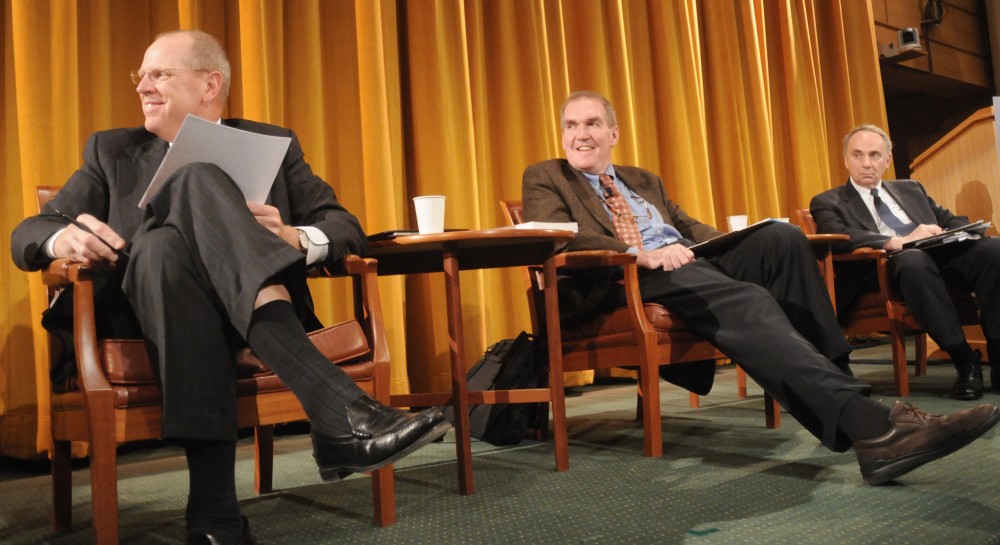Nearly 250 people filled Cowles Auditorium in the Humphrey Institute of Public Affairs Tuesday afternoon to listen to a panel of experts discuss the status of the economy. The panel included two spokesmen from the Minneapolis Federal Reserve Bank and two University professors, and was moderated by Humphrey Senior Fellow Jay Kiedrowski. âÄúI find it fascinating, right now, whatâÄôs going on in this country, and I want to learn more,âÄù Kiedrowski said. âÄúWe put together a panel that I think can really help answer some of the most difficult questions about the financial crisis.âÄù Panelist Art Rolnick , Minneapolis Federal Reserve Bank director of research, said he is on record for being optimistic about the economy for years. âÄúI still think youâÄôre going to find this is a very resilient economy and as we move through this, this economy will continue to grow,âÄù he said. Economics professor Tim Kehoe said he expects the economy to bounce back, likely over the next three to five years. âÄúFinancial crises are not necessarily a bad thing,âÄù Kehoe said. âÄúTheyâÄôre a natural thing to happen to an economy.âÄù The confidence expressed in the market by Kehoe and Rolnick is similar to how Federal Reserve consultant V.V. Chari said he thinks the economy operates. âÄúThe capitalist economy rests on a thin skin of confidence, and if you break that confidence, everything comes crashingly to an end,âÄù he said. Chari said obscurity is the enemy of financial markets. This has been the most unclear crisis recovery plan in history, he said, and policy makers continue to hide ideas from the public. âÄúWe have done so many things over the course of the last month or so in particular that IâÄôm convinced that some of the things must be right,âÄù Chari said of the policies made, drawing laughter from the audience. He also criticized the $700 billion bailout plan passed by Congress. âÄúAs far as the Fed is concerned, the Fed is now lending to anybody who meets one of two conditions: Either you are breathing and alive, or you are not breathing and dead,âÄù he said. Kehoe said CongressâÄô action is by no means a bailout, but rather a gamble by the government because financial institutions know they can be repaid by the government. Kehoe also discussed the perception of some companies being too large. âÄúIf we decided these financial institutions were too big to fail, we should have been regulating them,âÄù he said in regards to Fannie Mae , Freddie Mac , AIG, Bear Stearns and Merrill Lynch . The direct effects on the state economy remain unknown, state economist and applied economics professor Tom Stinson said. He said the stimulus package from the government was supposed to be a way to help put money into the economy, but the rising price of energy took a large percentage of the money. Humphrey graduate students Anne Huart and Shawn OâÄô Donnell said they attended to receive more information about the crisis. âÄúIn terms of looking at how the stock market has been performing and sort of trying to figure out what the impact means in the short term and the long term, I think they gave some insight into that,âÄù OâÄô Donnell said. A podcast of the panel will be available on the Humphrey website, and a blog about the crisis can be found at pubtalkblog.org.

Image by Paul Bangasser
Moderator Jay Kiedrowski, left, University economics professor Tim Kehoe, middle, and state economist Thomas Stinson discuss the current financial crisis at a panel discussion at the Cowles Auditorium in the Humphrey Institute of Public Affairs on Tuesday.
Humphrey panel discusses financial crisis
Published October 14, 2008
0

